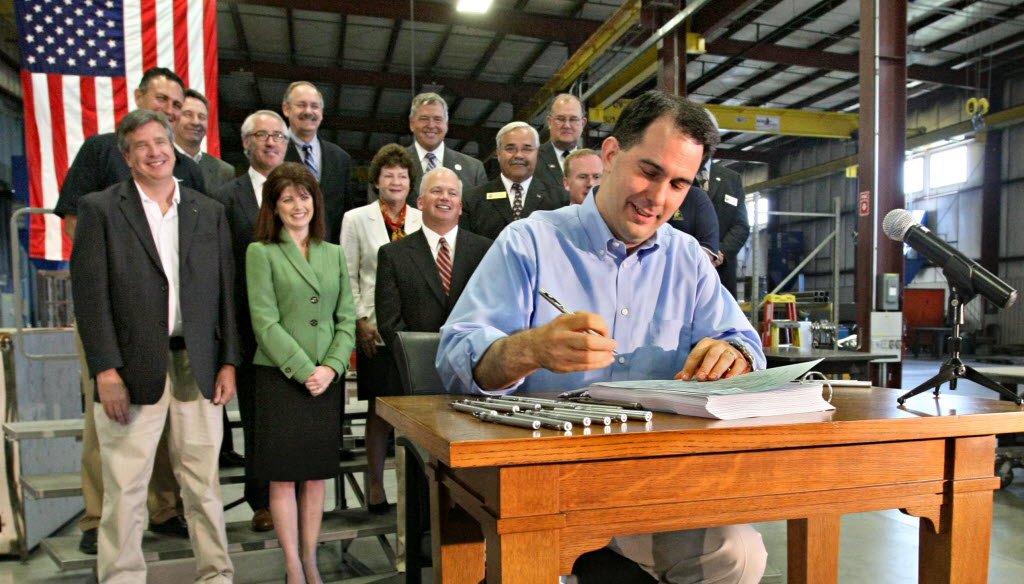Stand up for the facts!
Our only agenda is to publish the truth so you can be an informed participant in democracy.
We need your help.
I would like to contribute

Wisconsin Gov. Scott Walker signs the 2011-13 state budget
Striving last year to win over fiscally conservative voters in a contested Republican gubernatorial primary, Scott Walker pledged not only to avoid tax increases, but to cut a multitude of taxes for various groups.
It was an aggressive move. But he left himself little room to maneuver at a time when the sluggish economy was leaving a major budget gap for 2011-13.
What’s more, in many cases Walker pledged the tax cuts would be part of that first budget.
Those tax promises make up a major part of the 60-plus promises PolitiFact Wisconsin is tracking with the Walk-O-Meter, which uses six categories: In the Works, Stalled and Not Yet Rated as well as Promise Kept, Promise Broken and Compromise.
With the budget in the books, we can get a read on how Walker did.
The bottom line: Walker avoided general tax increases but did not keep his no-tax-increase promise. He was able to freeze property taxes. He also scored several clear wins, but in other cases wound up with a compromise, once ambitions were scaled back from an early pledge to reverse the tax-hike package Democrats passed in 2009.
Here’s a closer look at the status of key tax-related pledges, many of them focused on business:
The Big Picture
Walker’s clearest promise was to "oppose and veto any and all efforts" to increase taxes.
It was no small promise, given that Gov. Jim Doyle and fellow Democrats used $1.6 billion in tax increases -- mainly on high-income earners, investors, smokers and hospitals -- to help balance the budget in 2009.
Walker took a different tack, taking a bite out of spending on employee benefits and state education aid.
His budget reduced net state taxes by a bit, $23.6 million. That’s noteworthy in a bad economy, but hardly groundbreaking -- three of the previous six budgets cut taxes, including a $756 million reduction in 1999-2001, state records show.
But in balancing the 2011-’13 budget, Walker and Republicans asked certain low-income working poor families, renters and homeowners to shoulder a little more of the state’s tax burden -- about $69.8 million over two years. In the only two budget actions categorized by the non-partisan Legislative Fiscal Bureau as tax increases, the state budget cuts the Earned Income Tax Credit and the Homestead Tax Credit.
That earned Walker a Promise Broken rating from PolitiFact Wisconsin -- and scorn from critics.
"The governor said we were broke and everybody had to sacrifice, but in the final analysis there was no shared sacrifice," said Assembly Minority Leader Peter Barca (D-Kenosha).
Walker didn’t comment for this article, but other Republicans lauded the avoidance of big tax hikes.
"I don’t think there’s going to be any reduction in government services anyone would notice," said Sen. Glenn Grothman (R-West Bend), assistant majority leader. "In the past we had flabby budgets."
Grothman does not consider the earned income tax credit change a tax hike for the working poor. The nonpartisan Legislative Reference Bureau, long considered by both parties as a neutral scorekeeper on such items, scored it as an increase -- a key factor in the Promise Broken rating.
Another Walker promise was to eliminate the 2009 creation of an upper-income tax bracket for individuals making $225,000 or more, and married couples filing jointly at $300,000 or more.
He did not include that in his budget, which we also rated Promise Broken. A spokesman said it’s under consideration for the future.
The promise to fully roll back the Doyle tax increases was a Walker theme in late 2009 and early 2010. He did say he was rethinking his approach on taxes but never took the pledges off the table.
We gave Walker a Compromise on his actions regarding two of those Doyle moves:
- In one, he partially reversed the capital-gains tax credit that Doyle had trimmed, helping only some investors.
- In the other, he tweaked but did not eliminate a new requirement that multi-state corporations based here file a combined tax return. Proponents said it closed loopholes while critics said it would raise taxes and kill jobs.
It’s worth mentioning another Compromise rating dating to the January 2011 special session: Walker trimmed his promised small-business tax break.
Promises Kept
In describing Walker’s budget as an attack on the middle class, Democrats tend to look past the fact that Walker won approval for the tightest property tax freeze in years.
His plan means savings for homeowners and other property owners, and it earned him a Promise Kept rating. Walker used his veto powers to make sure the freeze does not sunset after the budget, and gives less wiggle room on the freeze for municipalities.
Walker earned another Promise Kept on cutting taxes for manufacturers, with an assist from Grothman, whose eleventh-hour insertion of a major tax cut for manufacturers and agricultural businesses represented one of the biggest tax breaks in years. The change would save businesses $359 million in taxes over five years, then $128 million annually after phase in. But it doesn’t kick in until late in the budget cycle, so there is little immediate impact.
Walker’s decision to promise so much in his first budget affected his recent grades on taxes, but there will be more to examine in the future.
Several factors weighed against a more aggressive tax agenda, including the budget gap and the political fallout from the fight with unions. Aides say Walker is considering further changes down the road.
Indeed, he has spoken of phasing out corporate income taxes as well as the state tax on retirement income. And he could revisit his pledge to undo some of the Doyle-backed changes from 2009.
"A strong recovery and a budget surplus could mean 2013 would look quite different in terms of tax law change," noted Todd Berry, president of the Wisconsin Taxpayers Alliance, a research organization.
If Republicans are still in charge, some will be pushing for deeper tax cuts, Grothman said.
"I think a lot of Republicans look forward to reductions in individual income tax in the future," he said.
Barca said Democrats are not opposed to holding down taxes to fuel economic growth.
But he said they will fight changes that put the middle class on a "starvation diet" while corporate interests get a "feast" with no requirements to actually create jobs.
Our Sources
Legislative Fiscal Bureau, summary of tax changes in state budget 2011-'13, June 13, 2011
Interview with Senator Glenn Grothman, July 6, 2011
Email exchange with Todd Berry, president, Wisconsin Taxpayers Alliance, July 5, 2011
Interview with Representative Peter Barca, July 5, 2011
Interview with Robert Lang, director, Legislative Fiscal Bureau, July 7, 2011
Email exchanges with Cullen Werwie, press secretary to Scott Walker, July 7, 2011

















































